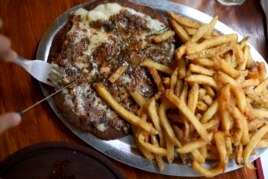15 September, 2019
Argentina is one of the world's leaders in beef consumption. Many people there love to eat meat.
But the country's meat-eating tradition is being threatened by a growing number of vegetarians and vegans, especially among young people.
A recent online questionnaire found that six out of every ten Argentines are willing to stop eating beef.
Adrián Bifaretti is head of marketing at the Institute for the Promotion of Beef. He wrote a report about the online survey.
Bifaretti noted that the findings show a growing cultural divide. The younger generations "have grown up amid the debate over abortion in Congress; inclusion, gender equality ... These collective questions have started to gain weight in decisions about the purchase of foods," he said.
The Chamber of Commerce for Beef and its Derivatives reported in July that Argentines are consuming on average 50 kilograms of beef a year. That number represents what it calls the lowest level of meat consumed in the country's history.
"This concern about cruelty and slaughter is here and is going to be felt," Bifaretti said. He added that movements from other parts of the world are arriving in Argentina. "It is starting to be a challenge," he said.
The cultural divide was clear several weeks ago when animal activists gathered near an event at the Buenos Aires Rural Society. They were met by cattle ranchers who charged at them on horses.
Much of the anti-beef activism comes from vegans.
Veganism developed as a movement in London during World War II. It is based on a diet free of animal products. Vegans also reject animal labor or use of animals in scientific experiments.
There are no official numbers in Argentina. But Adrian Bifaretti's group estimates vegans and vegetarians represent 7% to 8% of the population.

A dish at "La Reverde" vegan restaurant in Buenos Aires, Argentina, Friday, Aug. 30, 2019. A steak made with wheat gluten and ingredients including beet puree and spices help create a similar tone to beef. (AP Photo/Natacha Pisarenko
"I don't love eating animals," said Melissa Aruj, a 25-year-old. "Without a doubt, I estimate that in 10 to 15 years a large part (of the population) will be vegetarian."
"I don't know if they will be vegan," she added. The change will be "little by little."
A group of young people from the animal liberation group Voicot held a protest on a recent Saturday. They gathered at the entrance to a meat-processing center in Buenos Aires.
"It makes me very sad. Words are not enough for me to apologize to the animals because they have miserable lives. They are born with a date to die," said one protester, Jazmín Romero.
She wore clothing with the words: "We are the species threatening to destroy everything."
On the other side of the divide, many Argentines see eating beef as part of their history and culture.
"We aren't talking about killing the animal for sport. The animal is being transformed into food," said Bifaretti. "It has been like this throughout the history of humanity."
I'm John Russell.
Debora Rey reported on this story for the Associated Press. John Russell adapted it for Learning English. George Grow was the editor.
___________________________________________
Words in the Story
consumption – n. the using up of something; the eating or drinking of something
vegan – n. a person who does not eat or use animal products
abortion – n. a medical operation used to end a pregnancy and cause the death of the fetus
slaughter - n. the act of killing animals for their meat
doubt – n. a lack of sureness; indecision
miserable – adj. unhappy or sad; heartbroken
transform -- v. to change (something) completely and usually in a good way
We want to hear from you. Write to us in the Comments Section.